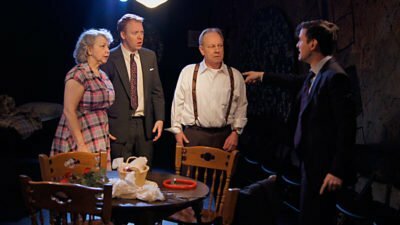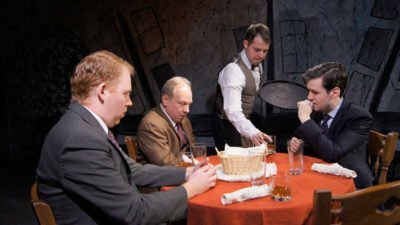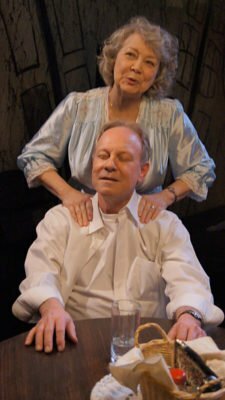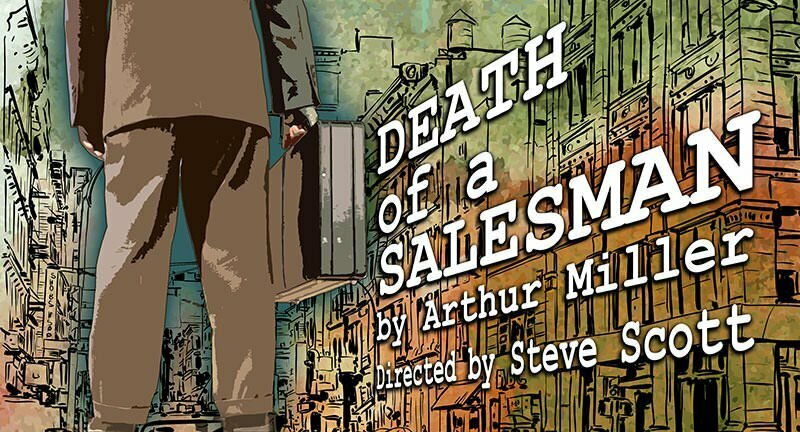Death of a Salesman – 2017
By Arthur Miller.
Directed by Steve Scott.
Produced by Redtwist Theatre, Chicago.
An American Classic.
The confrontation between illusion and reality is a noticeable theme in 20th century American drama (The Iceman Cometh, The Glass Menagerie), and among its best examples is Arthur Miller’s 1949 Pulitzer and Tony Award-winning tragedy Death of a Salesman. Redtwist Theatre’s current production of this American classic, directed by Steve Scott, is a modestly staged and decently acted rendition; though the production sustains more energy and enthusiasm than grounded passion, Miller’s superb script largely redeems its shortcomings.

Death of a Salesman so permeates our American subconscious, it hardly needs any introduction. Willy Loman (Brian Parry) is a husk of a man who has staked his life of 30-plus years of traveling salesmanship in the fruitless soil of unrealistic hopes and impractical principles—the pedestrian virtues of being well-liked and wearing a charming smile—to which the world has responded with brutal indifference, literally bricking-out the sun from alighting on his small, urban domain. Linda (Jan Ellen Graves), his wife, tries desperately to keep his hope alive, but the haunting regrets of Willy’s past, the failures of his present, and the shattering of his future—brought near by the arrival of his cherished son Biff (Matt Edmonds), his disillusioned heir—are truths too pointed and relentless to keep from exploding his insulating charade of illusion.

Making best use of their narrow theatre space, Redtwist’s production elects for a minimal set design, with only a table and chairs, a desk, and a bed. The script’s fluid transitions between the reality of the present and Willy’s hallucinations of the past are handled adeptly in such a set-up thanks to the evocative use of lights (designed by Daniel Friedman), but the overall sense of place is lost in the curious wall designs: the hanging, round, colorful mosaics readily evokes nothing, and the fanned brush strokes of high-rise buildings only barely suggest the suffocating encroachment of the city. The palatable presence of the city is a missed opportunity, since its contrast with Biff’s pastoral idealism is a recurring point of contention between father and son and their ideas of life; yet, nonetheless, Miller’s script is resilient and substantial enough to find sufficient staging in a solid black box.

As many attendees at the production of my attendance stood in ovation of the cast’s performance, many will likely find my opinions on the matter captious. Nevertheless, while the cast tackled their respective roles with energetic enthusiasm, I found it no substitute for a deeper conviction to their words that I found lacking in their quick or rehearsed delivery. From Biff’s reminiscence of his time on the farm, to Happy’s admission that he lowers his ideals, to Linda’s rebuke of her children—these moments lost their dramatic weight from what seemed to me a too shallow personalization with the actual text. Regardless, Parry’s Willy, on whom the force of the entire show rests, is a suitable vessel for the role, and the pathos of the story can be discerned, if not felt, in his relationship to Edmonds’ Biff.
Death of a Salesman is an American classic, and Redtwist’s production does it modest justice. If you’ve never seen it staged, it’s definitely worth seeing; if you have, there’s nothing outstanding in this production to regret skipping it.
Recommended.
August Lysy.
Reviewed on 5 February 2017.
For more info checkout the Death of a Salesman page at theatreinchicago.com.
Playing at the Redtwist Theatre, 1044 W Bryn Mawr, Chicago. Tickets are $30 on Thursdays and $35 on Fridays, Saturdays and Sundays, with a $5 discount for students and seniors. For tickets and information, call the box office at 773-728-7529, or visit Redtwist.org. Performances are Thursdays, Fridays, and Saturdays at 7:30 p.m., and Sundays at 3:00 p.m. through March 5th. Running time is 2 hours and 45 minutes, including one intermission.

